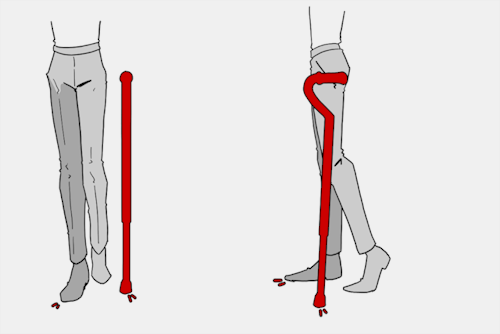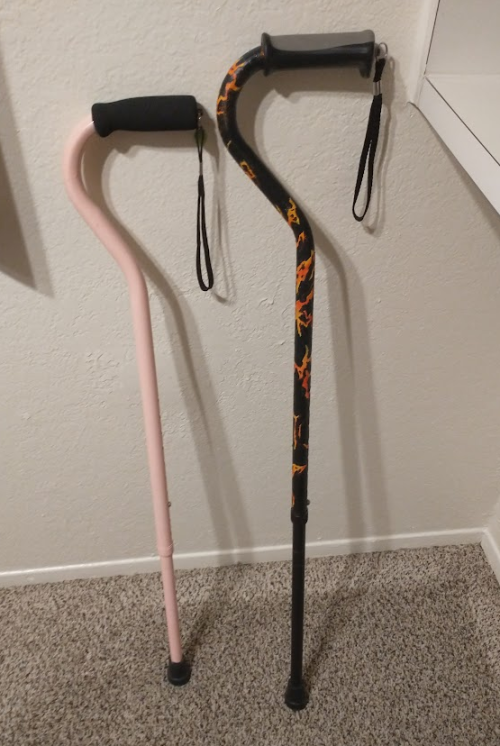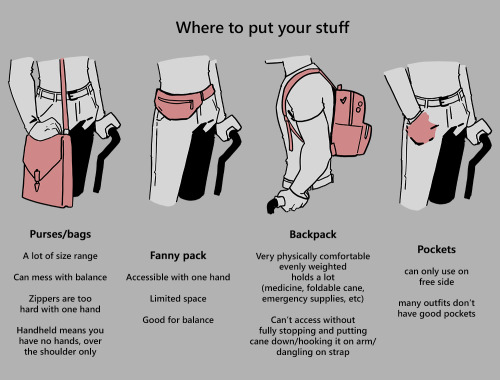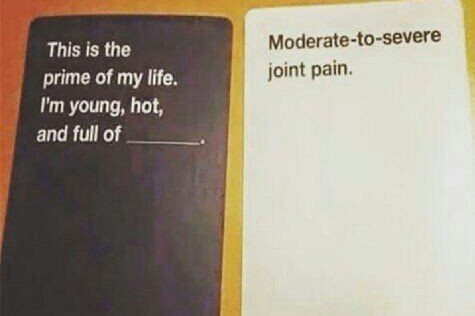A Friend Of Mine Recently Broke Her Foot.
A friend of mine recently broke her foot.
She's a wonderful friend. A deeply kind and considerate person. One of the first things she did after getting out of the hospital was to apologize to me.
"I'm so sorry. I had no idea."
"Hun, you're the one with the broken foot. What are you talking about?"
"I had no idea it was so hard for you all the time... There are stairs everywhere... Even in places where there's supposed to be a lift. And often the lift doesn't work. And there's pavement where my crutches keep getting stuck.... I'm so tired because walking like this isn't the same but there are no benches where I can rest....
You tried to explain and I thought I understood.... But I really had no idea. And this is what it's like for you ALL THE TIME.... I'm so so so sorry"
God how I cried.
More Posts from Fishability and Others
you ever go nonverbal but like... online? too fatigued to reblog anything with tags or interact with people
"gnc straight man being called a faggot doesn't experience homophobia" what the fuck are you talking about. there's absolutely no logic in anything like that. we have kids who literally killed themselves because of homophobic abuse in schools and you would dare to tell them it isn't homophobia that killed them because they weren't actually gay? insane. and so fucking cruel
Cosplayers, please don’t forget about those of us with disabilities at cons. Don’t push that walker or wheelchair out the way in artist’s alley because the owner of it isn’t touching it. Don’t give people funny looks for standing without their aids while they’re looking at things. Don’t get angry at the wheelchair user who has no choice but to go past your photographer because you’re taking up the entire space. Don’t kick out other cosplayers mobility aids. Keep space around you for disabled people, because we exist in your community and we just want to have fun like you do.
FYI to sick or disabled folks and those who assist or care for them: Simplicity patterns has a new line of adaptive sewing patterns. Designs include tops with port access, clothing with velcro closures, bags and cushions for mobility aids, bibs, chemo hats, and more.
I’m excited about these because they are the first patterns of this kind I’ve seen anywhere. And Simplicity patterns are great for beginning sewists, with very clear step by step instructions and illustrations.
Patterns can be purchased here: https://simplicity.com/simplicity/adaptive/
;
Things to research before getting your first custom manual wheelchair
one of the biggest things I can recommend to anyone getting a new custom chair (but especially a first custom chair) is to understand all of the parts of a wheelchair and what they do. I decided to make a guide with wheelchair parts to research and places to look for information to make this process a little bit easier. additional link suggestions are welcome.
General resources:
Permobil - The Wheelchair Handbook
Motion Composites - Preparing for Your Wheelchair Evaluation: Before the Evaluation (Part 1)
Motion Composites - Preparing for Your Wheelchair Evaluation (Part 2)
1. Frame
Motion Composites - Folding vs Rigid Wheelchair Frames: How to Choose
Permobil - Manual wheelchairs: rigid and folding frames. How do you choose?
GTK - Oh what’s in a frame? Comparing Multiple Materials
Motion Composites - Wheelchairs: Carbon Fiber Versus Aluminum
2. Front frame angle
Motion Composites - Understanding the Impact of Rigid Wheelchair Front Frame Angle
Sunrise Medical - Rigid Frame Wheelchairs – Frame Angle and Inset
4. Seat dump
Permobil - Ergonomic Seating and Manual Wheelchairs
Spinlife - Wheelchair Back & Seat Angle
5. Caster size, style, and position
Motion Composites - Front Casters for Manual Wheelchairs Practical Guide
Sunrise Medical - Front Caster Position in Manual Wheelchairs
6. Caster forks
New Mobility - Caster Wheels and Forks
Sunrise Medical - Maneuverability in Manual Wheelchairs - What Fork to use?
New Mobility - Innovations: Emerging Trends in the Wheelchair Market (information about single sided forks)
7. Footplate
Motion Composites - Footrest Options to Support Function and Mobility
When Tania Talks - Active User Wheelchair Footplate Options
8. Calf strap
Spex Seating - Lower Leg Support Considerations in Wheelchair Seating
9. Seat pan
Permobil - Solid Seat Insert for Wheelchair: Taking a Closer Look at Cushion Components
10. Seat cushion
Permobil - What to Look for in Seating & Positioning Products
Permobil - How to Choose a Cushion in Long Term Care
Permobil - Cushion Geometry: Linear and Contoured
Freedom Mobility Center - Wheelchair Seat Cushions: 5 Tips for Choosing the Right One for You
Mobility Basics - Seat Cushion Rigidizer
Motion Composites - Selecting the Right Cushion for Your Wheelchair a Clinicians Guide
Motion Composites - Covering the Basics of Wheelchair and Back Support Covers
11. Seat belts
12. Clothing guards
Sherman Oaks Medical Equipment - Wheelchair Clothes Guards / Side Guards Guide
13. Arm rests
United Spinal Association - Wheelchair Armrests What Do They Really Do?
Spinlife - Wheelchair Arm Rest Choices
Motion Composites - Armrests: Getting the Support you Need
14. Back supports
Motion Composites - Solid vs Upholstery Backs
Mobility Management - How to Choose the Right Back Height for your Client
Freedom Mobility Center - Why a Solid Back is Preferred Over a Sling Back
Mobility Basics - Back Supports
Sunrise Medical - Tips for Selecting Prefabricated Wheelchair Backs
Motion Composites - Covering the Basics of Wheelchair and Back Support Covers
15. Head supports
16. Push handles
Motion Composites - Push Handles: Pushing Around
17. Wheels
Motion Composites - Rolling Along: The Importance of Rear Wheel Selection
Sunrise Medical - Comparing Wheelchair Wheel Spoke Options
Mobility Basics - Manual Wheelchair Wheels
18. Tires
New Mobility - Everything You Need to Know About Selecting the Right Wheelchair Tires
GTK - Solid versus Pneumatic Tyres
Mobility Basics - Manual Wheelchair Wheels
Motion Composites - Tire Selection: Balancing Performance and Maintenance
19. Brakes
Motion Composites - Wheel Locks: Unlocking Safety and Function
20. Push rims/Hand rims
Motion Composites - Getting a Grasp: Understanding the Impact of Hand Rims
DME Hub - Wheelchair Hand Rom Options and Factors to Consider
21. Anti-tip wheels
22. Camber
Motion Composites - Camber - Degrees of Performance
23. Center of Gravity
Motion Composites - Rear Wheel Position 101
A general cane guide for writers and artists (from a cane user, writer, and artist!)
Disclaimer: Though I have been using a cane for 6 years, I am not a doctor, nor am I by any means an expert. This guide is true to my experience, but there are as many ways to use a cane as there are cane users!
This guide will not include: White canes for blindness, crutches, walkers, or wheelchairs as I have no personal experience with these.
This is meant to be a general guide to get you started and avoid some common mishaps/misconceptions, but you absolutely should continue to do your own research outside of this guide!
![[Image text] Arm bends a little. Cane height at hip joint. Many canes have adjustable height. Cane sits within the natural center of balance. Causes stress on: Triceps, upper back, wrist (pressure) fingers (grip). Helps with: Joints (lower back, hip, knee, ankle, foot), weakness, balance, pain.](https://64.media.tumblr.com/0c8731401f496885dc8d4309a7dbe7ee/f831b3159e1d7635-e7/s500x750/6e5fe00081a6ce3b64cbe1a648f0c967f9f601e9.jpg)
The biggest recurring problem I've seen is using the cane on the wrong side. The cane goes on the opposite side of the pain! If your character has even-sided pain or needs it for balance/weakness, then use the cane in the non-dominant hand to keep the dominant hand free. Some cane users also switch sides to give their arm a rest!
A cane takes about 20% of your weight off the opposite leg. It should fit within your natural gait and become something of an extension of your body. If you need more weight off than 20%, then crutches, a walker, or a wheelchair is needed.
Putting more pressure on the cane, using it on the wrong side, or having it at the wrong height will make it less effective, and can cause long term damage to your body from improper pressure and posture. (Hugh Laurie genuinely hurt his body from years of using a cane wrong on House!)

(an animated GIF of a cane matching the natural walking gait. It turns red when pressure is placed on it.)
When going up and down stairs, there is an ideal standard: You want to use the handrail and the cane at the same time, or prioritize the handrail if it's only on one side. When going up stairs you lead with your good leg and follow with the cane and hurt leg together. When going down stairs you lead with the cane, then the good leg, and THEN the leg that needs help.
Realistically though, many people don't move out of the way for cane users to access the railing, many stairs don't have railings, and many are wet, rusty, or generally not ideal to grip.
In these cases, if you have a friend nearby, holding on to them is a good idea. Or, take it one step at a time carefully if you're alone.
Now we come to a very common mistake I see... Using fashion canes for medical use!
![[Image text] 4 Major Handle Shapes (significant variation and uses). Tourist/Crook/Hook. Classic shape, fashion and medical, easy to hook on things (arm, door, chair, etc), generally solid wood (stronger, heavier). Offset. Newer design, not a fashion handle, only handle for quad-bases, generally better balance, usually aluminum (light + cheap), soft handle, adjustable (rattles/clicks when swinging). Derby/Fritz/Anatomical/Contour. Classic medical shape, many fashion variants, some fashion + medical, varies in many ways, sometimes contoured to hand, comes in foldable styles, many aluminum styles, many customizable styles. Knob/Decorative. Fashion exclusive, knob shape hurts the hand after prolonged pressure (especially with designs), tend to be heavy, "sword canes" have the same issues.](https://64.media.tumblr.com/102d2e5f13a88817eaa44974bc5a7486/f831b3159e1d7635-e2/s500x750/887023dbcfc758db12a7fcf3f258bca52eba2d53.jpg)
(These are 4 broad shapes, but there is INCREDIBLE variation in cane handles. Research heavily what will be best for your character's specific needs!)
The handle is the contact point for all the weight you're putting on your cane, and that pressure is being put onto your hand, wrist, and shoulder. So the shape is very important for long term use!
Knob handles (and very decorative handles) are not used for medical use for this reason. It adds extra stress to the body and can damage your hand to put constant pressure onto these painful shapes.
The weight of a cane is also incredibly important, as a heavier cane will cause wear on your body much faster. When you're using it all day, it gets heavy fast! If your character struggles with weakness, then they won't want a heavy cane if they can help it!
This is also part of why sword canes aren't usually very viable for medical use (along with them usually being knob handles) is that swords are extra weight!
However, a small knife or perhaps a retractable blade hidden within the base might be viable even for weak characters.
![[Image text] 4 Major base shapes (significant variation and uses). Adjustable base. Aluminum, standard modern medical, adjustable height, rubber base, wears down over time. Tripod/ quad base. If you need extra balance. Terrain attachment (varies, this is for ice). Removable, helps stop slipping on ice/snow/sand/etc, some canes have a retractable tip for ice. Classic base. Non-adjustable, custom only, modern standard still has a rubber base.](https://64.media.tumblr.com/78d350cfac4077376b7ce521a9a7d929/f831b3159e1d7635-ab/s500x750/4b4a6b8062c06686baf17c83c28b793bfb89e05b.jpg)
Bases have a lot of variability as well, and the modern standard is generally adjustable bases. Adjustable canes are very handy if your character regularly changes shoe height, for instance (gotta keep the height at your hip!)
Canes help on most terrain with their standard base and structure. But for some terrain, you might want a different base, or to forego the cane entirely! This article covers it pretty well.
Many cane users decorate their canes! Stickers are incredibly common, and painting canes is relatively common as well! You'll also see people replacing the standard wrist strap with a personalized one, or even adding a small charm to the ring the strap connects to. (nothing too large, or it gets annoying as the cane is swinging around everywhere)

(my canes, for reference)
If your character uses a cane full time, then they might also have multiple canes that look different aesthetically to match their outfits!
When it comes to practical things outside of the cane, you reasonably only have one hand available while it's being used. Many people will hook their cane onto their arm or let it dangle on the strap (if they have one) while using their cane arm, but it's often significantly less convenient than 2 hands. But, if you need 2 hands, then it's either setting the cane down or letting it hang!
For this reason, optimizing one handed use is ideal! Keeping bags/items on the side of your free hand helps keep your items accessible.

When sitting, the cane either leans against a wall or table, goes under the chair, or hooks onto the back of the chair. (It often falls when hanging off of a chair, in my experience)
When getting up, the user will either use their cane to help them balance/support as they stand, or get up and then grab their cane. This depends on what it's being used for (balance vs pain when walking, for instance!)
That's everything I can think of for now. Thank you for reading my long-but-absolutely-not-comprehensive list of things to keep in mind when writing or drawing a cane user!
Happy disability pride month! Go forth and make more characters use canes!!!



So many people wouldn’t have asthma in the first place if it wasn’t for these corporations…Shifting blame from actual culprits to people with asthma (and people who can’t help but use plastic straws at that) is peak capitalism.
I also would like to add Bill Shannon as a great source of reference poses for cool crutch positions. He is a wonderful dancer and disability activist and I love his work so much. Hope you enjoy this visual breakdown of some of the poses of Shannon Technique!
Crutches poses
-
 jmindigo liked this · 1 week ago
jmindigo liked this · 1 week ago -
 kanavitas reblogged this · 2 weeks ago
kanavitas reblogged this · 2 weeks ago -
 kanavitas liked this · 2 weeks ago
kanavitas liked this · 2 weeks ago -
 lookadreygon reblogged this · 2 weeks ago
lookadreygon reblogged this · 2 weeks ago -
 i-drink-and-i-meme-things reblogged this · 2 weeks ago
i-drink-and-i-meme-things reblogged this · 2 weeks ago -
 i-drink-and-i-meme-things liked this · 2 weeks ago
i-drink-and-i-meme-things liked this · 2 weeks ago -
 loki-the-trikster-god reblogged this · 2 weeks ago
loki-the-trikster-god reblogged this · 2 weeks ago -
 loki-the-trikster-god liked this · 2 weeks ago
loki-the-trikster-god liked this · 2 weeks ago -
 psychochromatic liked this · 2 weeks ago
psychochromatic liked this · 2 weeks ago -
 carbonarak liked this · 2 weeks ago
carbonarak liked this · 2 weeks ago -
 jishpokemontrainer reblogged this · 2 weeks ago
jishpokemontrainer reblogged this · 2 weeks ago -
 tparadox reblogged this · 2 weeks ago
tparadox reblogged this · 2 weeks ago -
 anarchy-and-dragons reblogged this · 2 weeks ago
anarchy-and-dragons reblogged this · 2 weeks ago -
 soiguessthisismyusername liked this · 2 weeks ago
soiguessthisismyusername liked this · 2 weeks ago -
 pricklythepear liked this · 2 weeks ago
pricklythepear liked this · 2 weeks ago -
 captainjeclid reblogged this · 2 weeks ago
captainjeclid reblogged this · 2 weeks ago -
 utmostopenmindedness reblogged this · 2 weeks ago
utmostopenmindedness reblogged this · 2 weeks ago -
 bookwyrmbran reblogged this · 2 weeks ago
bookwyrmbran reblogged this · 2 weeks ago -
 bookwyrmbran liked this · 2 weeks ago
bookwyrmbran liked this · 2 weeks ago -
 5kindsofmagic reblogged this · 2 weeks ago
5kindsofmagic reblogged this · 2 weeks ago -
 aidenabetting reblogged this · 2 weeks ago
aidenabetting reblogged this · 2 weeks ago -
 alyssumflowers reblogged this · 2 weeks ago
alyssumflowers reblogged this · 2 weeks ago -
 alyssumflowers liked this · 2 weeks ago
alyssumflowers liked this · 2 weeks ago -
 crazedporcupine reblogged this · 2 weeks ago
crazedporcupine reblogged this · 2 weeks ago -
 nekoabi reblogged this · 2 weeks ago
nekoabi reblogged this · 2 weeks ago -
 dysphoria-things liked this · 2 weeks ago
dysphoria-things liked this · 2 weeks ago -
 anarchy-and-dragons reblogged this · 2 weeks ago
anarchy-and-dragons reblogged this · 2 weeks ago -
 anarchy-and-dragons liked this · 2 weeks ago
anarchy-and-dragons liked this · 2 weeks ago -
 squidt0fu liked this · 2 weeks ago
squidt0fu liked this · 2 weeks ago -
 maybe-mystique liked this · 2 weeks ago
maybe-mystique liked this · 2 weeks ago -
 mjmimsy liked this · 2 weeks ago
mjmimsy liked this · 2 weeks ago -
 bookworm-2692 reblogged this · 2 weeks ago
bookworm-2692 reblogged this · 2 weeks ago -
 bookworm-2692 liked this · 2 weeks ago
bookworm-2692 liked this · 2 weeks ago -
 oatswithoatmilk reblogged this · 2 weeks ago
oatswithoatmilk reblogged this · 2 weeks ago -
 alysvolatile liked this · 2 weeks ago
alysvolatile liked this · 2 weeks ago -
 theropodtheroblogs reblogged this · 2 weeks ago
theropodtheroblogs reblogged this · 2 weeks ago -
 theropodtheroblogs liked this · 2 weeks ago
theropodtheroblogs liked this · 2 weeks ago -
 theskyawaitsmyhand liked this · 2 weeks ago
theskyawaitsmyhand liked this · 2 weeks ago -
 bacony-cakes reblogged this · 2 weeks ago
bacony-cakes reblogged this · 2 weeks ago -
 quixylvre reblogged this · 2 weeks ago
quixylvre reblogged this · 2 weeks ago -
 bestthingsinlifearemessy liked this · 2 weeks ago
bestthingsinlifearemessy liked this · 2 weeks ago -
 bestthingsinlifearemessy reblogged this · 2 weeks ago
bestthingsinlifearemessy reblogged this · 2 weeks ago -
 dru-the-agender-god reblogged this · 2 weeks ago
dru-the-agender-god reblogged this · 2 weeks ago -
 dru-the-agender-god liked this · 2 weeks ago
dru-the-agender-god liked this · 2 weeks ago -
 dangerous-button liked this · 2 weeks ago
dangerous-button liked this · 2 weeks ago -
 dnicoart liked this · 2 weeks ago
dnicoart liked this · 2 weeks ago -
 miestastilu liked this · 2 weeks ago
miestastilu liked this · 2 weeks ago -
 pajamas1t reblogged this · 2 weeks ago
pajamas1t reblogged this · 2 weeks ago -
 pajamas1t liked this · 2 weeks ago
pajamas1t liked this · 2 weeks ago -
 allgirlsareprincesses liked this · 2 weeks ago
allgirlsareprincesses liked this · 2 weeks ago

74 posts








